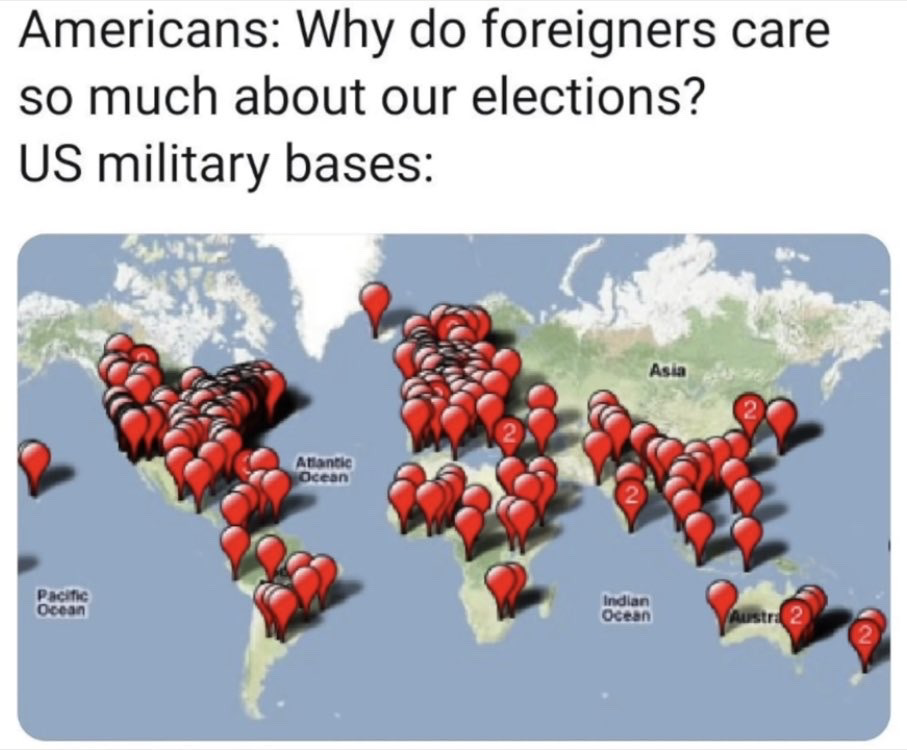this post was submitted on 13 Nov 2024
819 points (95.4% liked)
US Authoritarianism
1014 readers
15 users here now
ChonkyOwlbear is an Illegitimate Usurper
There's other groups and you are welcome to add to them. USAuthoritarianism Linktree
See Also, my website. USAuthoritarianism.com be advised at time of writing it is basically just a donate link
Cool People: [email protected]
founded 11 months ago
MODERATORS
you are viewing a single comment's thread
view the rest of the comments
view the rest of the comments

Some countries have their people elect their government
Right, right... like the US just did?
How's that vote on healthcare coming along?
I was thinking more European countries, since the discussion was, you know, foreign countries hosting US military bases
So-called "liberal democracy" works pretty much the exact same way it does in Europe (or anywhere else) as it does in the US.
Ie, it's 95% capitalism and 5% fake democracy substitute (the ratios vary slightly but never by much). And, like "liberal democracy" everywhere, the 5% fake democracy substitute will be rapidly replaced with 5% very not-fake fascism if you threaten the 95% capitalism part in any way whatsoever.
Lol no. Much of Europe ranks much higher in all sort of democracy, press freedom etc indexes. Not all liberal democracies are created equal.
I'm guessing you're having a real hard time understanding that there is absolutely NOTHING democratic about so-called "liberal democracy," eh?
Why is that? Is the new information clashing with your programming?
I mean I've voted for a candidates in municipal, health care area, parliamentary and European Parliament elections. Hell, even in church elections. I've had friends as candidates, seen stuff get through from a single person's suggestion through to reality through what I'd call democratic means and action, I've worked with different campaigns and parties and have seen change happen through that.
If that doesn't count as democratic then not sure what you consider democratic tbh because that's the stuff I think of when I think of democracy.
It just seems to clash with the common definition of the word, is all. If democracy isn't that sort of stuff then I wonder what it is and where you might find it, if anywhere.
Okay. I'll give it to you - Finland allows it's population more democracy-like privileges than you'd find in most other countries, and it probably isn't even the only one that does that.
But tell me this... how many of the corporations Finnish people work for is democratically run?
I mean it's not like we haven't fought for those. Can't expect someone to just give you these privileges. But more to the point, when I think of democracy it's all those things that make up the whole. Citizen participation, citizen ability to affect things, free and fair elections, freedom of the press and so on. And I don't mean those as absolute terms yes/no but rather as sliders that you'd use to gauge not if a country was straight up democratic or not but rather how democratic/how not democratic it is. And I'd say Finland is far enough into the democratic side that I'd say we do have democracy here.
I mean a very significant chunk of workforce and economy works through cooperatives. And those have elections. Our biggest chain of shops is a cooperative, one of the biggest banks is also, there's energy and forestry and so on. Out of 5,5 million people over 4 million are members of a cooperative. So not sure how many that's numerically out of all corporations but when you consider the size and impact of them, it's a big portion. Of course there's the factor that we're also heavily unionized and unions have both a very strong foothold and legal status. And those have elections ofc. But it's different from cooperatives where you vote for stuff, if that's what you were asking about.
It's all just the sort of stuff I'd say made up democracy. Saying there's nothing democratic about Finland just feels weird and wrong. If we have nothing democratic, who does??
They do. However, I'm sure you can imagine an elected government acting in a way that the majority disagrees with. We're about to see it in the US (actually, we have for years if not decades). This is not just a US phenomenon, there's actual research showing that in liberal democracies, there's very little correlation between what the general public wants, and the policies instated by their elected officials. There is a strong correlation with the interests of the owning class though.
Here's a study for American politics: https://www.cambridge.org/core/journals/perspectives-on-politics/article/testing-theories-of-american-politics-elites-interest-groups-and-average-citizens/62327F513959D0A304D4893B382B992B
There's a Danish study as well. I'm having terrible trouble finding it though. It's an important addition because the democrats not representing the interests of the working class could in theory be a consequence of the US's two party system. The same result holding in multi-party Denmark shows that this is not the case.
At any rate, the point is that just because these countries are liberal democracies doesn't mean their population wants a US military presence.
No it doesn't automatically mean people want it, but add in stuff like living next to Russia and suddenly it's very easy to understand why some actually want it.